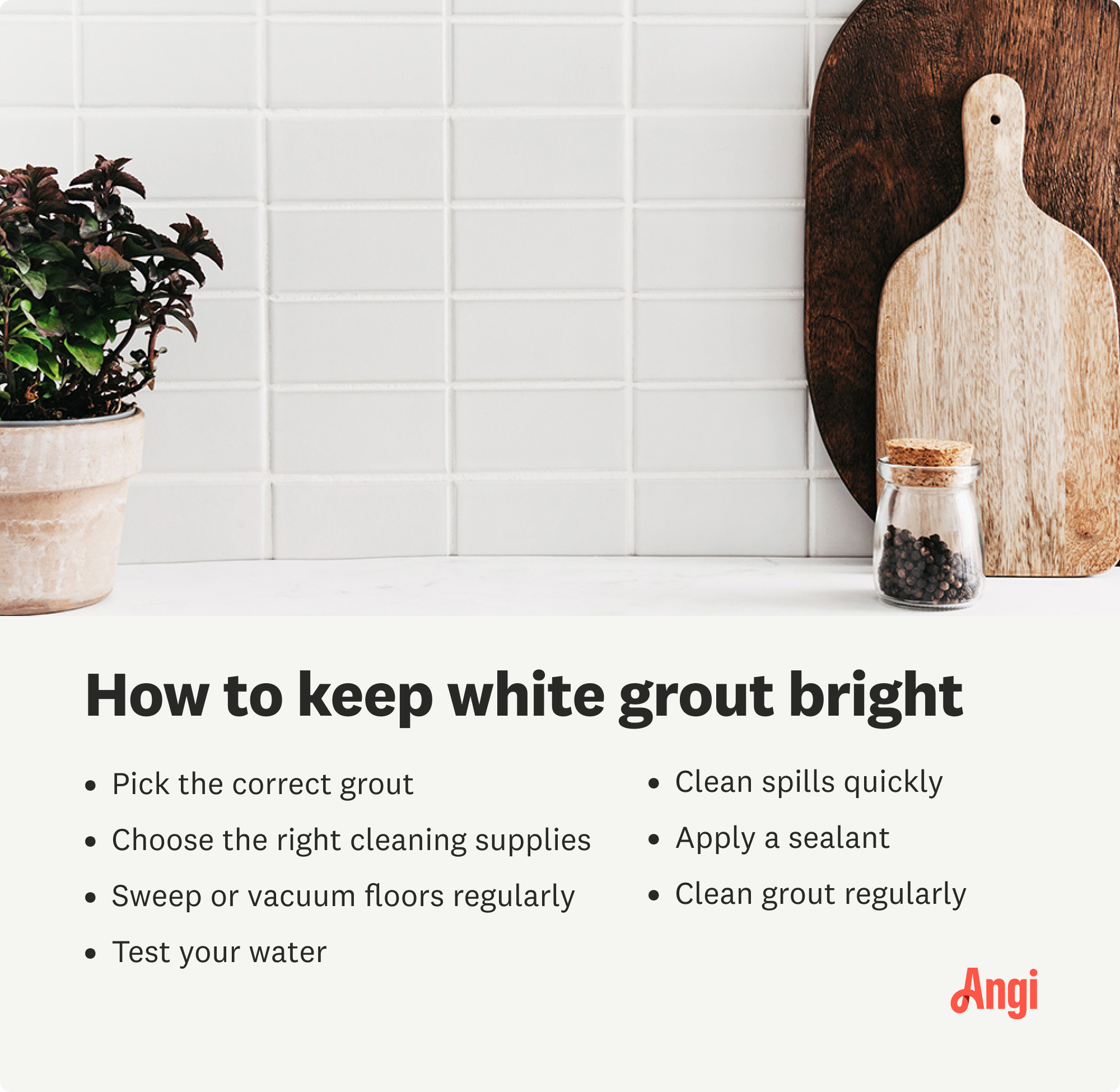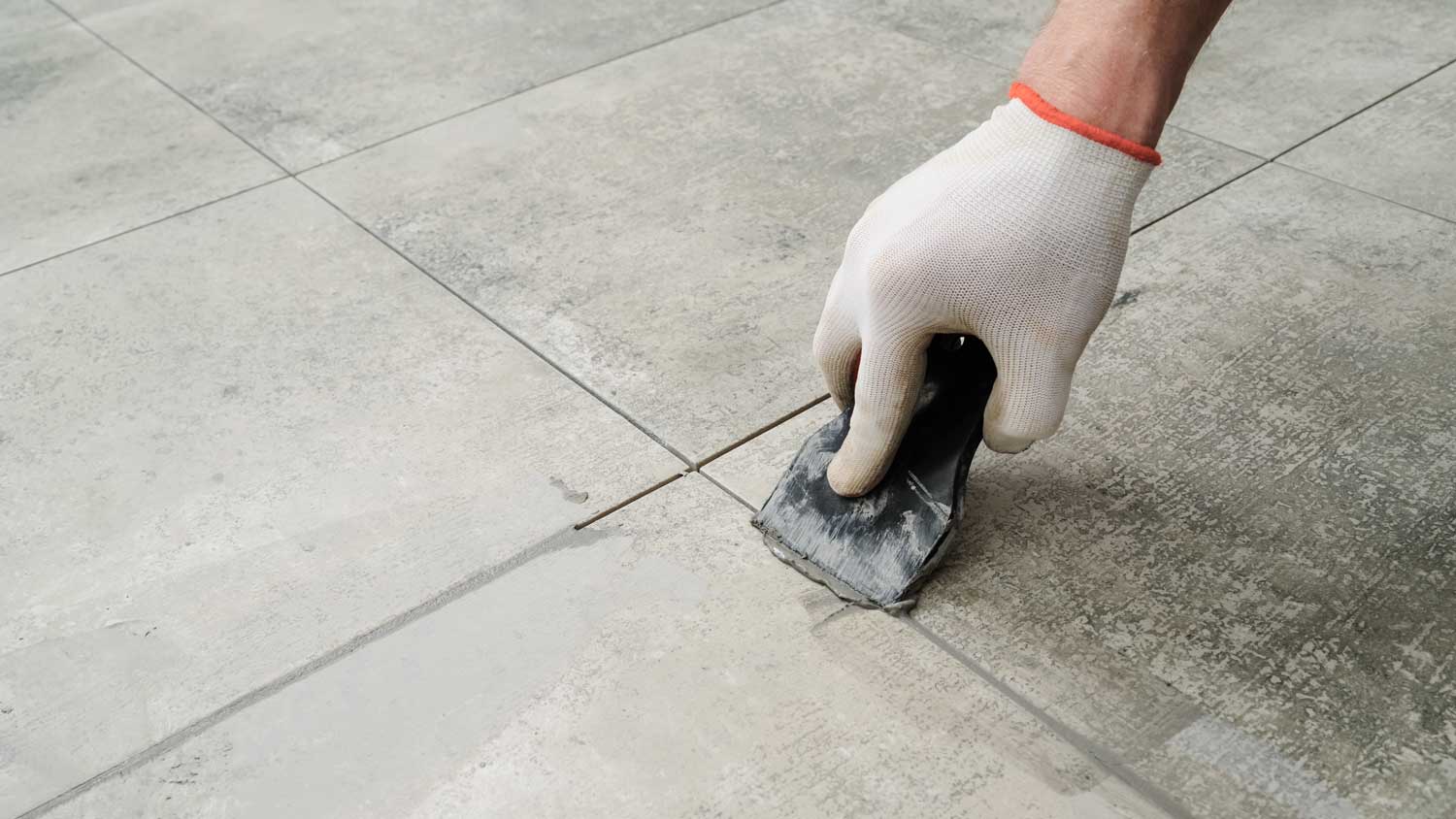
Damaged tiles should be fixed right away. In this guide, find out all of the different factors that affect your tile repair cost.
Sealing grout costs $150 to $250, with the average landing at $200. The price depends on the tile material and size, the condition of the grout, and whether you hire a professional or DIY.
.jpg)
.jpg)
Tile contractors charge $30 to $60 per hour to seal grout.
If you have smaller tiles, your grout sealing costs will increase.
Grout sealing is meticulous and time-intensive work, so you should leave the job to a pro.
The average cost to seal grout is $150 to $250 for 160 square feet of space, including materials and labor, though the price depends on the size of your tiles and the condition of your grout. Sealing grout is an easy way to protect your beautiful subway tile backsplash or the luxurious marble countertop you splurged on during your last home reno.
A grout repair specialist near you can tackle the job, or you can do the project yourself with the right tools and supplies. Sealing your tile should be done about every three years to keep your grout free from mold, deterioration, and dirt buildup.
Many factors affect the cost of sealing grout, including:
Most tile contractors charge per square foot to seal grout; the more area you have, the more you can expect to pay. For example, a 160-square-foot area may cost $1.56 per square foot, but a larger area may cost as much as $2.00 per square foot.
Some contractors also charge a flat per-hour fee. The larger your area, the more hours the contractor will need to seal your grout. On average, tile contractors charge $30 to $60 per hour to seal grout, and depending on the size, it can take two to five hours.
The smaller the tiles, the more work is required, increasing the cost of sealing your grout. This is especially true if you’re paying per hour since it takes longer to seal more grout. Some contractors will increase the per-square-foot price for smaller tiles, which can put you at the higher end of the average cost, closer to $2 per square foot.
The type of tile matters when paying for cleaning and sealing the grout. Tiles with a matte finish, such as natural stone tiles, are more difficult to clean and will result in a higher cost to clean and seal—averaging $3 to $4 per square foot.
If you don’t want to clean floor tile grout yourself, you can pay a contractor for tile and grout cleaning before sealing your grout. The tile and grout cleaning cost will increase your overall cost, but if you seal dirty grout, you’ll seal the dirt and grime into your tiles.
Depending on the size of the area, tile size, and type, you could pay as much as $4 per square foot for both services.
Fortunately, the materials needed for sealing grout are minimal. Whether you DIY grout sealing or hire a contractor, you’ll pay an average of $0.30 to $0.50 per square foot.
Labor will be the majority of your cost when sealing grout since it’s a tedious job. On average, you can expect to pay $1 to $2 per square foot for labor, depending on whether you hire a local grout repair specialist for grout sealing only or both grout sealing and cleaning.

The materials needed to clean and seal grout yourself in a 160-square-foot space cost about $60 to $110. You’ll need to purchase grout cleaner, grout sealer, applicators, a sponge, a bristle brush, a bucket, and wiping rags. If your tile floors or walls are particularly dirty, you may need to buy or rent a steam cleaner.
| Materials to Seal Grout | Average Cost |
|---|---|
| Grout cleaner | $10 |
| Grout sealer | $15 |
| Applicators | $5 |
| Bristle brush | $5 |
| Bucket | $5 |
| Wiping rags | $15 |
If you already know how to seal grout, the project usually takes three hours for 160 square feet. Depending on your skill level and the size of your tiles, it could take longer.
If your tile grout is extra dirty, the cleaning process could be extensive. In this case, it’s often best to hire a professional grout cleaner near you. They’ll likely use a low-pressure steamer to rid your grout of deep-seated dirt and stains.
You could cut your costs in half by sealing the grout yourself, but you must consider your time. If you hire a professional with a lot of experience, they could likely finish the job much faster than you. So you’re trading your time for money, not to mention the peace of mind of knowing the job was done right the first time.
If you don’t seal your grout properly, you might end up paying a professional to fix it, or it could even cause damage to your tiles, requiring tile repair or replacement, increasing your costs further.
Cleaning and sealing grout makes your tile look cleaner, last longer, and resist moisture. Tile installation cost—plus the cost of tiles—is a hefty investment, so cleaning and sealing the grout protects your investment and eliminates the need for you to learn how to regrout a tile floor.
Dirt and grime won’t build up on the tiles, making them look cleaner longer. This will naturally lengthen the life of your tile, as it will block out moisture, which sealing grout does, too. When tiles can’t absorb moisture, there’s a lower risk of mold and mildew growth, which not only lengthens the life of your tile but also protects your family’s health and well-being.

Wondering how you can save some dough? Here are our top tips for this project:
DIY grout sealing: Sealing grout yourself is the easiest way to save money on grout sealing costs. If you’re confident in your ability to seal it properly and have the time, you can save as much as $110 to $140. However, hiring a pro can save you a lot of time, get you a pristine appearance, and keep you from the strain and pain that comes with sealing jobs.
Clean the grout yourself: If you want a professional to seal the grout, you can handle the cleaning beforehand to cut costs. Just make sure you clean the grout right before they come to seal it to avoid any dirt or debris accumulation before it’s sealed. Either way, sealing grout saves on the cost of regrouting tile floors, which is more expensive and labor-intensive.
Get multiple bids: As with any home improvement project, you should always contact at least three contractors about pricing. You could also consider hiring a handyperson instead, who might charge a bit less than a specialist.
Home is the most important place on earth, which is why Angi has helped more than 150 million homeowners transform their houses into homes they adore. To help homeowners with their next project, Angi provides readers with the most accurate cost data and upholds strict editorial standards. We extensively research project costs to develop the pricing data you see, so you can make the best decisions for you and your home. We rely on reputable sources, including the U.S. Bureau of Labor Statistics, academic journals, market studies, and interviews with industry experts—all to ensure our prices reflect real-world projects.
Want to help us improve our cost data? Send us a recent project quote to [email protected]. Quotes and personal information will not be shared publicly.
From average costs to expert advice, get all the answers you need to get your job done.

Damaged tiles should be fixed right away. In this guide, find out all of the different factors that affect your tile repair cost.

You're planning a bathroom remodel, but how much will it cost to retile your bathroom? Read this guide to find out.

Discover the average cost of grout repair, key price factors, and tips to save. Get expert advice to plan your grout repair project with confidence.

Goodbye dingy grout, hello pristine tiles! Learn how to keep white grout clean like a pro with seven grime-busting tips.

Before you can apply mortar, lay tile, and finish with grout, you need a flat, even surface to work with. Learn how to level a floor for tile with this guide.

Porcelain and ceramic tiles aren’t exactly the same. Discover the key differences between porcelain versus ceramic tile, including cost, durability, and more.